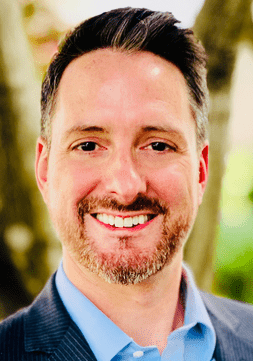Editor’s note: Joshua Goocey teaches a faith and finance class at Wake Forest Divinity School. He is a former pastor and now runs a wealth management firm that advises individuals, families and small businesses on how to build generational wealth. What follows here is a letter he wrote his students at year-end encouraging healthy spiritual and financial habits.
Thank you for a wonderful semester and for your deep engagement during our months together. I hope you found at least a few ideas that will help you lead your families and your communities with fiscal common sense, prudence and justice.
As you continue to think about your future spiritual and financial states, keep the following in mind:

Joshua Goocey
The actions you take (or don’t take) today build your future, the future of the church and the future of the world. Choose well and act wisely.
Choose your end before everything else, and if you haven’t decided on an end, someone else already has decided for you. For Christians, our end is simple, to become like Christ, which means our ultimate end, the one that will fulfill us, is a life of loving service to the one who creates us at every moment.
In relation to finances, every dollar should be used in service of the Creator who gives us being and existence. If we use money to feed ourselves, we do it because God wills our well-being. If we use it to shelter ourselves, we do it because God wills our protection. If we use it to pay medical bills, we do it because God wills our health. If we use it to feed, shelter or heal others, we do it because God wills the well-being, protection and health of our neighbors.
“Set specific, measurable, attainable, relevant and time-bound financial and spiritual goals that will help you make progress to your end.”
Set specific, measurable, attainable, relevant and time-bound financial and spiritual goals that will help you make progress to your end. The only way to observe change (for good or bad) is through measurement. If you are serious about progress (spiritually or financially), you must define your end, figure out where you are currently and map out a path from A to B.
Spiritually, that means observing your mental and emotional states (most importantly, how much you love or fail to love), defining the contours of your inner landscape and using the tools at your disposal for transformation: prayer, Scripture, sacraments, doctrine, acts of mercy, etc. Don’t be afraid to count how many times you read Scripture or pray in a week. That is not legalism. Do you think any of the great athletes failed to count how many times they went to practice, worked out, how many calories they consumed?
Financially, your most important counting is in relation to what you are earning, what you are spending and what you are investing. How much do you need to have invested to fulfill your divinely instituted obligation to care for yourself and your family? In addition to caring for yourselves, some of you may feel called to give a little or a lot of money away. How much will you need to have invested (on top of the nest egg you need for yourself) to meet the needs of your particular calling of charity? Generally speaking, most of us will need somewhere between $1 million and $2 million in investment capital to meet our retirement needs. If you want to care for others, you will need more.
Simply stated, try to save at least 20% of your gross annual income for your long-term well-being. If you want to fulfill the Christian call to charity financially, you will need to save more, which means you will have to deny yourself many of the pleasures the rest of the world indulges. Thankfully self-denial (lovingly and freely chosen) brings more joy and peace than all the ephemeral pleasures of the world.
“Try to save at least 20% of your gross annual income for your long-term well-being.”
Within the order of practical finance, be sure to leverage the benefits of tools at your disposal: employer benefits, Roth IRAs, the various insurances, diversified portfolios, the expertise of others who have proved themselves worthy of your trust.
A brief note on that last one. Don’t take a Calvinistic stance toward capitalism. It isn’t totally depraved. To be sure, it has many flaws. Why wouldn’t it? It’s a human system, which is to say it is marked by all the fears, prejudices and greed that mark imperfect creatures.
If you have given up on capitalism, then you have given up on human beings. That is a sunless and desperate valley to sink into because ultimately, if you have given up on human beings, then you have given up on God and God’s work of redemption. You have lost all hope, and if you have lost all hope, you have lost all faith. If you find yourself in that place, pray for faith: “I believe, help my unbelief!”
“Through faith, you will even learn to spy the divine at work in financial systems.”
Through faith you will learn to see God, not only in the trees and flowers, stars and galaxies, but also in the pages of Scripture, the actions of the sacraments and the lives of the saints. Through faith, you will even learn to spy the divine at work in financial systems, markets, business growth, consumption and systems of exchange.
Fight the devils of despair, hopelessness and cynicism with humility, faith and love. And if you are wondering how to become more humble, more faith-filled and more loving, take up the mundane work of reading Scripture, participating in the Eucharist and giving yourself in service of others.
Finally, don’t forget about or fret over things beyond your control. The uncontrollable events in life are the stones upon which our spiritual perfection is forged. Inflation, down-markets, sickness, death, taxes, the desires of other people (that conflict with our desires), these are all the blessed consequences of human community.
We do well to avail ourselves of the financial tools that help us smooth out the undulating terrain of communal chaos (cash reserves, insurance, diversified portfolios). At the same time, we don’t put our ultimate hope in financial instruments. They are good for what they can do, but they never will fully insulate us from the vagaries of life together.
And that is OK. If we were totally insulated from community, we would be condemned to changelessness, eternally imprisoned in our current condition with no hope of growth. That would be terrible.
The great news is that, in addition to financial instruments, we have powerful spiritual instruments (Scripture, prayer, sacraments) that produce an unshakeable foundation of faith, hope, love and humility that lead to lasting kindness, justice and peace.
Thanks be to God.
Joshua Goocey lives in Winston-Salem, N.C. where he runs a wealth management firm that advises individuals, families and small businesses on how to build generational wealth. Before starting a wealth management firm, he served as a pastor for 15 years and earned two master’s degrees at Wake Forest University as well as a research doctorate at Duke University in theology, ethics and economics. He wrote his dissertation on the ethics of wealth accumulation and greed and has taught courses in theology, ethics and finance at Wake Forest University and Duke University. He is a Roman Catholic and a member of St. Leo’s Catholic Church. He also serves on the board of the ABP Foundation, which supports BNG.


